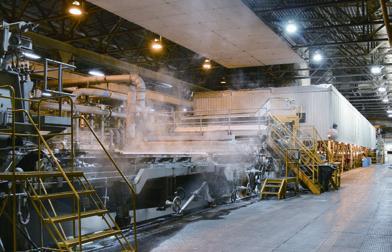Keeping Papermaking Alive in the West
2020-01-09ByZhaoWei
By Zhao Wei
At ND Papers mill in Rumford, a town in the U.S. state of Maine, some of the workers have added a personal touch. They have brought their own potted plants and put them next to the machines to brighten up the place.
“It is a small thing that doesnt impact the mills performance,” said Ken Liu, CEO of ND Paper. “But then it shows our employees care that were building a long-term business.”

ND Paper is a wholly owned subsidiary of Hong Kong-listed Nine Dragons Paper Holdings, the largest containerboard producer in Asia. The Chinese company acquired the Maine mill with over 600 employees in 2018, making it the biggest of the four mills it has acquired in the U.S. over the last two years. The other three are in Old Town, also in Maine, Biron in Wisconsin, and Fairmont in West Virginia.
ND Paper put in capital to upgrade the equipment and expand the mills manufacturing capacity while maintaining the same workforce. The four mills employ 1,400 workers in total and annually produce about 1.1 million tons of pulp and paper, which made ND Paper win the 2019 Excellence in Job Creation and Economic Development Award given by the China General Chamber of Commerce-USA.
Now it is investing $189 million in the Biron mill to convert one machine to produce containerboard and build a greenfield paperrecycling facility. In 2020, it will put fresh capital in the Rumford mill to improve the asset quality.
While investing directly in paper mills in the U.S., ND Paper is also teaming up with local universities to foster the next generation of papermakers.
The communitys backbone
Three of the four mills that it acquired in the U.S. were built more than 100 years ago. “If you were to ask some of the residents in these communities fi ve years ago, I think a lot of them would have said these mills were at the risk of closure,” Liu told Beijing Review at the headquarters of ND Paper in Chicago.
The Old Town mill is one of them. It had been running for more than 150 years, producing pulp and tissue paper. Its business began to drop in the early 2000s. In 2015, it was shut down and the nearly 200 workers were laid off.
“We never thought this place would open this time,” Thomas Higgins, who had been working at the mill since 1980, told Maine Public Radio.
Then in October 2018, ND Paper acquired the idle mill from OTM Holdings and the following year, it was officially reopened under the new management. Today, Higgins is back at the mill with new energy.

“Im 60 years old now. And Im going to stick it out as long as I can to make sure this place works. And I feel good now, because my son is here now. Just got hired. And I hopefully see him here for his whole life, career. And ND Paper, hopefully, is going to do that,” Higgins told the radio station.
According to ND Paper, the relaunched mill directly supports 130 full-time jobs. Indirectly, through the vendor supply chain, it supports the equivalent of 545 jobs, generating an income of$27.8 million. The employee spending impact provides additional sales for Maines businesses, supporting the equivalent of 255 jobs and earning $10.9 million. The total job impact of the Old Town project, therefore, amounts to the equivalent of 930 jobs for Maine, the company said in a press release.
“What we want to do is to ensure that there is long-term competitiveness in each one of these mills,” Liu said. “And with that will come community job security and long-term sustainability for the [local] communities.”
The mills are mostly based in rural areas where they are large economy drivers in the local communities.
“We take that very seriously. We understand that we are in many ways the backbone of these communities. And we need to be a responsible citizen in this area,” Liu added.
Clean production
The focus is to operate in a clean, safe and effi cient style and be environmentally sustainable like its parent company.
“No environmental management, no papermaking. Thats a slogan from the parent company,” Liu said. “We take that to heart in all the things that we do.”
He gave the example of the Fairmont mill. The mill buys recycled paper—what people put in recycling bins—from all the major Midwest and East Coast hubs, all the way from Boston to New York to Pittsburgh and Chicago. “We help collect over 300,000 tons of recycled fi ber every year,” he said. The paper would have probably gone into landfi lls if it had not been bought and recycled.
At the Rumford mill, much of the energy is generated from renewable sources, including the wood waste generated by pulp production, for example. It is burned in a clean and sustainable way to produce energy and the same technology is practiced at the Old Town mill, Liu said, adding that the company is also looking at ways to reduce energy and water consumption.
Future of the industry
While 30 years ago the largest paper-consuming sectors were newsprint, magazine and writing paper industries, the fastest growing segment today is packaging, thanks to the rapid development of e-commerce.
“For us as a company, we evolve with how people live as their lives change. And with that, theres a bright future for people who want to go into papermaking,” Liu said.
However, a lot of paper mills have closed in the U.S. over the last 10 to 15 years. Because of that, a lot of young people dont want to go into papermaking, he said. “What we always share with them is that papermaking evolves with the way people live.”
Liu thinks that its an obligation of companies or the industry to develop the next generation of papermakers. He is a board member of the Pulp and Paper Foundation at the University of Maine where he works on this. Through the foundation, ND Paper had a yearround interaction with the university, including giving students career guidance advice and making recruitments. Additionally, ND Paper contributed $15,000 to the university.
Last year, ND Paper supported the University of Maine, the University of Wisconsin, and a variety of other institutions that provide education and scholarships for students who want to become papermakers.
“Our hope is that we can be a resource to help encourage future papermakers to go into the industry and realize that papermaking is an environmentally sustainable and a healthy career,” Liu said.
